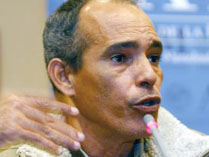The utility company had just cut off the electricity supply to his house. Darkness and shadows were back in Alejandro Gonzalez Raga’s life. His rented apartment in Madrid–shared with his wife, siblings, and in-laws–was as devoid of light as the Cuban cells in which he was jailed for five years after Castro´s “Ofensiva 2” operation in March 2003, also known as the “Black Spring.” Even so, Gonzalez Raga came to the presentation of Attacks on the Press 2008 at the Madrid Press Association.

Our report found that in Cuba 21 imprisoned journalists are living in inhumane conditions, while their struggling families and other working independent journalists are continuously harassed on the other side of prison doors. During the first year of Raúl Castro’s official presidency, a few changes took place in Cuba, though not many with a direct impact on press freedom. However, CPJ found that a new generation of tech-savvy bloggers has been able to find a way past official control of the Internet and openly criticize the Cuban government on overseas Web sites, giving a glimpse of what could become a place for open debate about Cuba from within the island.
On February 16, 2008, Gonzalez Raga was released and forced into exile in Spain, alongside Cuban independent journalist José Gabriel Ramón Castillo. “When we were arrested, none of us was planning any assault on a military barrack or wearing a balaclava,” said Gonzalez Raga, one of the 75 Cuban dissidents arrested by Cuban authorities on March 18, 2003. “Most of the things we were caught with were old writing machines, a few radios, drafts of press articles, and copies of the Universal Declaration of Human Rights.” Of the 29 journalists jailed in 2003, 20 remain in Cuban prisons.
Unemployed, struggling to start a career in journalism in the Spanish media, worried for his jobless wife, Berta, and the future of his children, Gonzalez Raga devoted his presentation at the Press Association to some of his colleagues who remain jailed on the island: Alfredo Pulido, Normando Hernández, and Ricardo González Alfonso. “Brothers” in his basic, fundamental mission: to live free, to write in freedom. The rest–a home, electricity, a job for his wife, a computer–can wait, he said. But his needs certainly remind us of our duties. No journalist should be forced to live, or work, in darkness.
UPDATE: After meeting with Alejandro Gonzalez Raga yesterday, we spoke to the local electric company, which promised to expedite the process of returning electrical service to the journalist’s home. We also spoke to the local mayor and secured free computer classes for Gonzalez Raga.